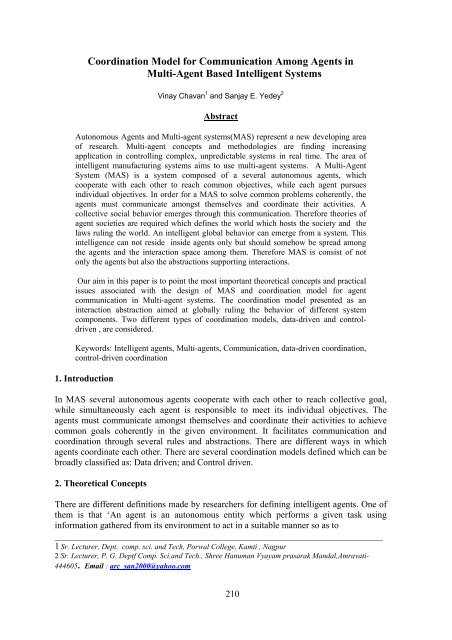7 - Indira Gandhi Centre for Atomic Research
7 - Indira Gandhi Centre for Atomic Research
7 - Indira Gandhi Centre for Atomic Research
You also want an ePaper? Increase the reach of your titles
YUMPU automatically turns print PDFs into web optimized ePapers that Google loves.
Coordination Model <strong>for</strong> Communication Among Agents in<br />
Multi-Agent Based Intelligent Systems<br />
Vinay Chavan 1 and Sanjay E. Yedey 2<br />
Abstract<br />
Autonomous Agents and Multi-agent systems(MAS) represent a new developing area<br />
of research. Multi-agent concepts and methodologies are finding increasing<br />
application in controlling complex, unpredictable systems in real time. The area of<br />
intelligent manufacturing systems aims to use multi-agent systems. A Multi-Agent<br />
System (MAS) is a system composed of a several autonomous agents, which<br />
cooperate with each other to reach common objectives, while each agent pursues<br />
individual objectives. In order <strong>for</strong> a MAS to solve common problems coherently, the<br />
agents must communicate amongst themselves and coordinate their activities. A<br />
collective social behavior emerges through this communication. There<strong>for</strong>e theories of<br />
agent societies are required which defines the world which hosts the society and the<br />
laws ruling the world. An intelligent global behavior can emerge from a system. This<br />
intelligence can not reside inside agents only but should somehow be spread among<br />
the agents and the interaction space among them. There<strong>for</strong>e MAS is consist of not<br />
only the agents but also the abstractions supporting interactions.<br />
Our aim in this paper is to point the most important theoretical concepts and practical<br />
issues associated with the design of MAS and coordination model <strong>for</strong> agent<br />
communication in Multi-agent systems. The coordination model presented as an<br />
interaction abstraction aimed at globally ruling the behavior of different system<br />
components. Two different types of coordination models, data-driven and controldriven<br />
, are considered.<br />
Keywords: Intelligent agents, Multi-agents, Communication, data-driven coordination,<br />
control-driven coordination<br />
1. Introduction<br />
In MAS several autonomous agents cooperate with each other to reach collective goal,<br />
while simultaneously each agent is responsible to meet its individual objectives. The<br />
agents must communicate amongst themselves and coordinate their activities to achieve<br />
common goals coherently in the given environment. It facilitates communication and<br />
coordination through several rules and abstractions. There are different ways in which<br />
agents coordinate each other. There are several coordination models defined which can be<br />
broadly classified as: Data driven; and Control driven.<br />
2. Theoretical Concepts<br />
There are different definitions made by researchers <strong>for</strong> defining intelligent agents. One of<br />
them is that ‘An agent is an autonomous entity which per<strong>for</strong>ms a given task using<br />
in<strong>for</strong>mation gathered from its environment to act in a suitable manner so as to<br />
________________________________________________________________________<br />
1 Sr. Lecturer, Dept. comp. sci. and Tech, Porwal College, Kamti , Nagpur<br />
2 Sr. Lecturer, P. G. Deptf Comp. Sci.and Tech., Shree Hanuman Vyayam prasarak Mandal,Amravati-<br />
444605. Email : arc_san2000@yahoo.com<br />
210
















